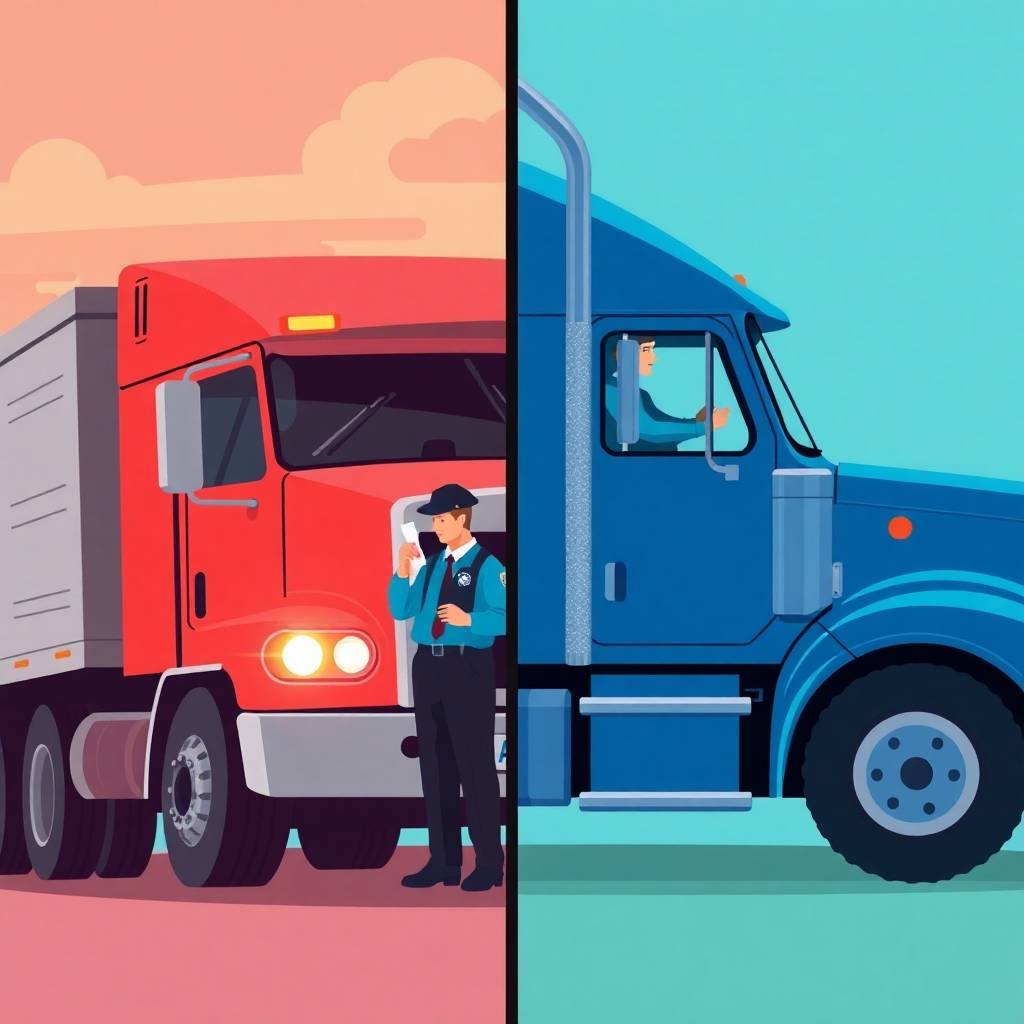1. Understanding the Basics: What Is Interstate vs Intrastate Carrier Compliance?
For motor carriers, understanding the distinction between Interstate vs Intrastate Carrier Compliance is crucial to avoiding costly violations, audit failures, and operational setbacks. While the terms may sound similar, they refer to fundamentally different regulatory frameworks and compliance obligations that impact how carriers operate under the law.
Whether you’re a new trucking company or a seasoned owner-operator, knowing the ins and outs of Interstate vs Intrastate Carrier Compliance can help you remain on the right side of federal and state transportation laws.
Defining Interstate and Intrastate Operations
Interstate commerce refers to transporting goods or passengers across state or national borders. If a vehicle crosses state lines, or the intent of the transport involves crossing state lines, it is considered interstate—even if the trip begins and ends in the same state. In contrast, intrastate commerce means transportation that occurs entirely within one state and does not cross any borders.
To remain compliant, carriers must determine their operation type and follow the corresponding rules, often enforced by the Federal Motor Carrier Safety Administration (FMCSA) for interstate carriers, and by state agencies for intrastate operations.
Key Differences in Compliance Requirements
When evaluating Interstate vs Intrastate Carrier Compliance, the primary differences lie in the level of regulation:
- Interstate carriers must register with the FMCSA, obtain a USDOT number, and comply with federal rules regarding drug and alcohol testing, hours of service, vehicle maintenance, and driver qualifications. Learn more about driver qualification file requirements to stay compliant.
- Intrastate carriers are only subject to state-level compliance but may still need a USDOT number, depending on the state’s requirements. They are often exempt from certain FMCSA rules unless hauling hazardous materials.
Understanding Your Compliance Responsibilities
For Interstate vs Intrastate Carrier Compliance, carriers must maintain proper documentation, including accurate DQ file setup and monitoring and participation in a compliant driver drug and alcohol testing program. Additionally, FMCSA Clearinghouse compliance is mandatory for interstate operators.
Avoiding FMCSA compliance mistakes starts with understanding your scope of operations. Failure to comply may result in DQ file violations or audit penalties. If you’re unsure, our DOT Audit Preparation services can help you stay ahead.
Registration and Filing Requirements
Interstate carriers must ensure proper filings with the Unified Carrier Registration (UCR), BOC-3 process agent compliance, and possibly IFTA/IRP/BOC-3 support for fuel tax reporting.
Intrastate operators may face fewer filings but still must adhere to their state’s requirements. For help, our team provides support for UCR filing deadlines and IFTA filing requirements.
Why This Matters to Your Business
The consequences of failing to meet Interstate vs Intrastate Carrier Compliance include suspended operations, fines, and revoked licenses. Proper compliance improves safety scores in the FMCSA Safety Measurement System (SMS 2025), enhances credibility with clients, and prevents unnecessary audits.
To ensure you’re aligned with all federal expectations, reference our FMCSA compliance requirements for trucking companies and tools like the DOT Compliance Checklist.
Schedule a Compliance Consultation
Whether you’re navigating Interstate vs Intrastate Carrier Compliance or managing random DOT drug testing requirements, professional guidance is essential. You can schedule your appointment today to speak with a compliance specialist.
Visit Truckers Compliance Hub for expert articles, checklists, and insights on everything from pre-employment DOT drug testing requirements to DOT compliance checklist services for owner-operators.
Valuable Resources for Carriers
Explore our full suite of FMCSA compliance services for owner-operators and companies, including drug and alcohol testing management and administrative filings. We also offer practical resources through:
- FMCSA compliance help for trucking companies
- FMCSA compliance services for owner-operators (package 2)
Final Thoughts
Navigating the complexities of Interstate vs Intrastate Carrier Compliance is not something to leave to chance. With state and federal regulations evolving frequently, staying informed and proactive is key. Whether you operate across state lines or within a single jurisdiction, compliance is the foundation of your trucking business.
Stay updated with trusted resources like Transportation.gov and our own posts at Truckers Compliance Hub, and make sure to review our Disclaimer, Privacy Policy, and Terms of Service for complete transparency.

2. Step 1: Verify Your Carrier Classification to Avoid Costly Errors
In the trucking and transportation industry, the first critical step toward full regulatory compliance is correctly identifying whether you operate as an interstate or intrastate carrier. Interstate vs Intrastate Carrier Compliance directly impacts the type of licenses, filings, and safety standards your business must meet. Failing to classify your carrier status correctly can result in hefty fines, operational delays, and disqualification during audits.
Understanding the difference between interstate vs intrastate carrier compliance is not just about regulatory language—it’s about protecting your business, reputation, and bottom line.
What’s the Difference? Interstate vs Intrastate Explained
If you operate across state or national lines, or if your cargo is intended for delivery across state boundaries—even if you only drive in one state—you are considered an interstate carrier. On the other hand, intrastate carriers operate solely within the borders of a single state and only engage in commerce that begins and ends within that state.
The distinction is fundamental to meeting federal requirements, such as those enforced by the Federal Motor Carrier Safety Administration (FMCSA) and guidelines outlined by the U.S. Department of Transportation.
Why Correct Classification Matters
Misclassifying your carrier operation can lead to serious FMCSA compliance mistakes. If you register as an intrastate carrier but engage in interstate commerce, you’re likely violating federal law. Conversely, registering as an interstate carrier when operating intrastate could mean you’re burdened with unnecessary regulatory obligations.
Accurate classification determines whether you’re subject to FMCSA Clearinghouse compliance, pre-employment DOT drug testing requirements, or mandatory driver qualification file requirements. Each of these is vital to staying within the parameters of legal operation.
Compliance Check: What You Must Know
To ensure full compliance based on your carrier type, consider using a DOT Compliance Checklist tailored to your operation. For owner-operators, the DOT Compliance Checklist for Owner-Operators provides additional guidance.
For both carrier types, services such as DQ file setup and monitoring, drug and alcohol testing management, and UCR filing assistance are crucial to maintaining compliance year-round.
Real-World Impacts of Misclassification
Incorrectly filing as the wrong carrier type often leads to DQ file violations or poor performance metrics in the FMCSA Safety Measurement System (SMS 2025). This can trigger audits or penalties.
Preparing for a potential audit? Our DOT Audit Preparation services are designed to help you avoid costly oversights. If you’re unsure whether you fall under interstate or intrastate status, it’s best to schedule an appointment with our compliance specialists.
Interstate vs Intrastate Carrier Compliance: Common Filing Requirements
For interstate carriers, essential filings include:
- USDOT Number (Federal)
- Operating Authority (MC Number)
- BOC-3 Process Agent Compliance
- IFTA and IRP registration
- Random DOT drug testing requirements
For intrastate carriers, compliance may be governed entirely by state laws, though many states require a USDOT number and participation in safety programs.
Both carrier types should be aware of drug and alcohol testing compliance and a driver drug and alcohol testing program, depending on the nature of their cargo and equipment.
Take Advantage of Expert Services
Staying ahead of interstate vs intrastate carrier compliance requirements can be overwhelming. That’s why we offer a suite of helpful services:
- IFTA Filing Requirements
- UCR Filing Deadlines
- FMCSA Compliance Requirements for Trucking Companies
- FMCSA Compliance Services for Owner-Operators
- FMCSA Compliance Help for Trucking Companies
Visit our homepage at Truckers Compliance Hub for additional tools and guidance.
Schedule Your Compliance Consultation
Taking the first step to verify your carrier classification can save you thousands in penalties and administrative headaches. Don’t leave it to chance. Book your appointment with a compliance specialist and ensure your carrier status is accurate.
We also encourage you to review our Disclaimer, Privacy Policy, and Terms of Service for more information on how we support your compliance journey.
Final Thoughts
Verifying your carrier classification is not just step one—it’s the foundation of every decision your trucking business will make. Whether you’re crossing state lines or not, Interstate vs Intrastate Carrier Compliance governs everything from your filings to your safety procedures. Get it right the first time to protect your business, avoid violations, and stay road-ready.
Let Truckers Compliance Hub be your trusted partner in navigating every detail of Interstate vs Intrastate Carrier Compliance with confidence and accuracy.

3. Step 2: Meet Licensing and Registration Requirements in Both Jurisdictions
In the complex world of transportation, proper licensing and registration are critical to ensuring compliance with federal and state regulations. Whether you’re hauling freight across state lines or operating exclusively within one state, meeting the specific requirements of interstate vs intrastate carrier compliance is non-negotiable. Skipping this essential step can result in serious fines, suspended operations, and lost business opportunities.
Understanding how interstate vs intrastate carrier compliance affects your registration obligations is the foundation for a smooth, legally sound operation. This article explores the requirements for both jurisdictions and helps you take the right steps to stay compliant.
Understanding the Jurisdictional Divide
The distinction between interstate and intrastate operations is more than a technicality—it determines which agencies you report to, what licenses you need, and how you maintain regulatory compliance.
- Interstate carriers operate across state lines and must comply with federal regulations administered by the Federal Motor Carrier Safety Administration (FMCSA) and the U.S. Department of Transportation.
- Intrastate carriers operate only within a single state and typically fall under state-specific rules. However, they may still be subject to select federal regulations depending on vehicle type and cargo.
Correctly classifying your carrier status in line with interstate vs intrastate carrier compliance helps you avoid errors when applying for required licenses and filings.
Core Licensing Requirements for Interstate Carriers
If you’re an interstate carrier, the following registrations are mandatory:
- USDOT Number
- MC Number (Operating Authority)
- BOC-3 Filing (BOC-3 Process Agent Compliance)
- Unified Carrier Registration (UCR) – stay current with UCR Filing Deadlines
- IFTA and IRP Registration (IFTA/IRP/BOC-3 Support Services)
Each of these plays a critical role in maintaining interstate vs intrastate carrier compliance. For help managing your UCR and IFTA filings, consider our UCR Filing Assistance and IFTA Filing Requirements services.
Licensing for Intrastate Carriers
For intrastate carriers, licensing is typically handled at the state level. While a USDOT number may still be required in some states, intrastate carriers often avoid MC numbers and federal authority registration unless transporting federally regulated cargo. However, they are still subject to regulations around:
- Driver Qualification File Setup (Driver Qualification File Requirements)
- DOT Drug and Alcohol Testing Programs (Drug and Alcohol Testing Compliance)
To remain aligned with interstate vs intrastate carrier compliance, intrastate carriers should utilize the DOT Compliance Checklist or our DOT Compliance Checklist for Owner-Operators.
Avoiding Common FMCSA Compliance Mistakes
Whether you operate across state lines or within a single state, many carriers make costly compliance mistakes by overlooking registration details. Mistakes in licensing, failing to maintain DQ file monitoring, or ignoring drug testing policies often result in DQ File Violations.
We’ve outlined these and other issues in our guide on FMCSA Compliance Mistakes. Planning ahead, and using compliance services, can save time and prevent penalties.
Drug and Alcohol Testing and Licensing Implications
Licensing compliance isn’t limited to vehicle registration—it includes meeting DOT drug testing regulations. This applies to both interstate and some intrastate carriers. You should be enrolled in programs that manage:
Leverage our Drug and Alcohol Testing Management services for full compliance.
Use Professional Support to Navigate Registration
Our team at Truckers Compliance Hub is here to simplify your journey through interstate vs intrastate carrier compliance. If you’re not sure where to start, schedule a consultation with a compliance expert.
Need help with audits? Explore our DOT Audit Preparation service and be fully prepared before inspectors arrive.
Learn More and Stay Compliant
Truckers should regularly review their compliance against FMCSA requirements. Stay informed with valuable resources:
- FMCSA Compliance Help for Trucking Companies
- FMCSA Compliance Services for Owner Operators
- FMCSA Safety Measurement System (SMS 2025)
- FMCSA Clearinghouse Compliance
We also encourage all carriers to review our FMCSA Compliance Requirements for Trucking Companies for a complete picture.
Final Notes
As a carrier, complying with both federal and state registration standards is step two in a successful operational roadmap. Fully meeting the licensing demands of interstate vs intrastate carrier compliance ensures you avoid disruptions, stay audit-ready, and build a professional reputation.
Visit Truckers Compliance Hub to explore more articles and tools, and make sure to review our Disclaimer, Privacy Policy, and Terms of Service before getting started.
Let us help you take the right next step in your compliance journey—starting with getting your licensing and registration right in both jurisdictions.

4. Step 3: Stay Aligned with Safety and Medical Requirements Year-Round
Maintaining year-round safety and medical compliance is essential for both interstate and intrastate motor carriers. Whether you’re operating across multiple states or within one, staying up to date with evolving regulations is key to meeting interstate vs intrastate carrier compliance requirements. Failing to meet federal and state safety protocols could result in steep fines, failed audits, or even the suspension of your operating authority.
In this article, we’ll cover how to stay consistently aligned with safety and medical standards, ensuring full compliance for your fleet and drivers every day of the year.
Why Safety and Medical Requirements Matter in Carrier Compliance
In the context of interstate vs intrastate carrier compliance, safety and medical standards are enforced to protect drivers, cargo, and the public. The Federal Motor Carrier Safety Administration (FMCSA) and U.S. Department of Transportation mandate strict rules on driver health, safety records, and equipment inspections.
For both carrier classifications, adhering to these standards ensures a safer road environment and helps companies avoid compliance pitfalls. Whether you’re hauling across state lines or operating intrastate, you must be proactive and prepared year-round.
Maintain Updated Driver Qualification Files
One of the most overlooked aspects of interstate vs intrastate carrier compliance is keeping Driver Qualification (DQ) Files updated and complete. A missing or outdated medical certificate, driving history, or employment verification can trigger DQ File Violations during audits.
Our DQ File Setup and Monitoring service helps ensure that your files are audit-ready at all times—removing the risk of last-minute scrambling when FMCSA inspectors show up.
Year-Round DOT Medical Certification Compliance
Medical certification is another cornerstone of interstate vs intrastate carrier compliance. All commercial drivers must pass a DOT physical exam by a certified medical examiner. These medical certificates must be valid and up to date at all times. Expired or missing certifications can disqualify drivers and create legal complications for carriers.
To support your drivers, include periodic reminders and use our DOT Compliance Checklist for Owner-Operators as a tracking tool to stay on schedule.
Drug and Alcohol Testing: Preemptive and Random Monitoring
FMCSA regulations mandate that drivers must be part of a comprehensive drug and alcohol testing program. Compliance begins with pre-employment drug testing and extends into random testing throughout the year.
Our Drug and Alcohol Testing Management service ensures you’re always aligned with the FMCSA Clearinghouse Compliance protocols, while also reducing administrative burdens.
For additional insights, our post on Drug and Alcohol Testing Compliance outlines the procedures and expectations for both interstate and intrastate carriers.
Monitor Safety Scores and Inspection Results
Another critical year-round task is monitoring your fleet’s safety performance using FMCSA’s Safety Measurement System (SMS). Poor scores can lead to interventions or heightened scrutiny during audits.
Routine internal audits and the use of our DOT Audit Preparation services can keep your records clean and reduce the chance of unexpected penalties.
Additionally, the FMCSA Compliance Mistakes article highlights common pitfalls that carriers—especially small fleets and owner-operators—should avoid throughout the year.
Integrated Support for All Compliance Needs
Understanding and maintaining interstate vs intrastate carrier compliance is no small task, especially when dealing with safety and medical records. That’s why our complete FMCSA Compliance Services for Owner-Operators and FMCSA Compliance Help for Trucking Companies offer strategic, ongoing support.
If you’re unsure where your business stands, start with a free consultation. Schedule your appointment today to speak with a compliance expert who can help you stay aligned with year-round safety requirements.
Consistency Is Key in Compliance
The rules of interstate vs intrastate carrier compliance don’t allow for pauses or grace periods. Year-round attention to safety, medical certifications, and documentation is the only way to avoid violations. Use our DOT Compliance Checklist to perform quarterly or monthly self-checks and stay ahead.
Don’t let one expired medical certificate or missed drug test derail your entire operation. Let Truckers Compliance Hub support your business with resources tailored to your carrier type and size.
More Resources to Help You Succeed
To learn more about the specific FMCSA regulations that impact your business, check out:
- FMCSA Compliance Requirements for Trucking Companies
- FMCSA Compliance Services for Owner Operators – Part 2
- IFTA, IRP, and BOC-3 Filing Support
- BOC-3 Process Agent Compliance
Before proceeding, please review our Disclaimer, Privacy Policy, and Terms of Service.
Conclusion
To stay compliant in the trucking industry, every carrier must adopt a year-round approach to safety and medical requirements. Interstate vs intrastate carrier compliance may vary by jurisdiction, but the need for consistent documentation, regular health monitoring, and updated safety records remains universal.
Stay ahead of the curve with the tools and support offered by Truckers Compliance Hub—your partner in year-round compliance excellence.

5. Step 4: Monitor and Maintain Your Records to Stay Inspection-Ready
When it comes to Interstate vs Intrastate Carrier Compliance, staying inspection-ready year-round hinges on one core responsibility: consistent, accurate recordkeeping. Whether you operate across state lines or solely within one, the Federal Motor Carrier Safety Administration (FMCSA) requires carriers to keep meticulous documentation to demonstrate regulatory compliance.
From driver qualification files to drug testing records, every document must be accessible, up to date, and audit-ready. In this article, we’ll break down what records you need, why they matter, and how to build a system that ensures compliance for both interstate and intrastate operations.
Why Recordkeeping Is Crucial for Carrier Compliance
The distinction between Interstate vs Intrastate Carrier Compliance lies in jurisdictional oversight, but both are subject to strict inspection standards. The FMCSA and U.S. Department of Transportation regularly conduct audits, inspections, and compliance reviews. A disorganized or incomplete file can result in violations, fines, or even the revocation of operating authority.
To prevent this, truckers and fleet managers must maintain a clear system for tracking and updating all compliance-related documents. For more background on what inspectors look for, review our DOT Audit Preparation Guide for 2025.
Start with a Reliable Documentation Checklist
For both interstate and intrastate carriers, using a standardized documentation checklist is essential. Our DOT Compliance Checklist and DOT Compliance Checklist for Owner-Operators provide detailed guidance on what records to maintain and when to update them.
Understanding the nuances of Interstate vs Intrastate Carrier Compliance means knowing which federal rules apply to your fleet and which are state-specific. Regardless of scope, keeping records centralized and backed up is a non-negotiable best practice.
Driver Qualification Files: Stay Current and Complete
Driver Qualification (DQ) Files are one of the first areas FMCSA inspectors review. These must include employment history, MVRs, medical certificates, and safety performance history. Failure to keep these updated can lead to serious DQ File Violations.
We recommend using our DQ File Setup and Monitoring service to avoid errors and ensure you’re always prepared. For detailed guidelines, visit our post on Driver Qualification File Requirements.
Drug and Alcohol Testing Program Records
Carriers are required to maintain extensive records of drug and alcohol testing—including pre-employment and random testing. These documents are vital to both FMCSA Clearinghouse Compliance and internal reviews.
Our Drug and Alcohol Testing Management solution simplifies the process. You can also learn more about what’s required in our comprehensive guide to Drug and Alcohol Testing Compliance.
Whether you’re operating under interstate or intrastate authority, drug testing documentation is a core component of staying compliant with FMCSA regulations.
Monitor Safety Metrics and Prepare for Audits
Your safety score—calculated through FMCSA’s Safety Measurement System (SMS)—depends heavily on the quality and accuracy of your operational records. Monitoring this data allows you to spot potential issues before they trigger enforcement action.
For support, consider our FMCSA Compliance Help for Trucking Companies and explore our tips on avoiding FMCSA Compliance Mistakes.
The Value of Proactive Compliance Systems
Too often, carriers focus only on compliance during audit season. This reactive approach puts your business at risk. Instead, implementing a proactive, organized compliance system helps you maintain inspection readiness year-round.
This is especially vital in the ongoing challenge of Interstate vs Intrastate Carrier Compliance, as both types of operations must meet overlapping but sometimes differing requirements. For consistent support, our IFTA, IRP, and BOC-3 Support Services and UCR Filing Assistance are designed to reduce your administrative workload while boosting compliance efficiency.
Access More Resources to Stay Compliant
At Truckers Compliance Hub, we help carriers of all sizes simplify and automate their compliance. Whether you need BOC-3 Process Agent Compliance, IFTA Filing Requirements, or UCR Filing Deadlines, we’ve got you covered.
Want to speak with a compliance expert about your recordkeeping strategy? Schedule a consultation today.
You can also explore these additional resources:
- FMCSA Compliance Services for Owner-Operators – Part 1
- FMCSA Compliance Services for Owner-Operators – Part 2
- FMCSA Compliance Requirements for Trucking Companies
Final Thoughts: Recordkeeping is Compliance Insurance
In the world of Interstate vs Intrastate Carrier Compliance, keeping your records organized is your insurance policy against failed audits, lost revenue, and DOT penalties. It’s not just about meeting federal or state requirements—it’s about building a foundation of trust, transparency, and operational excellence.
To stay up to date on the latest compliance news and tips, visit the Truckers Compliance Hub blog. Also, don’t forget to review our Disclaimer, Privacy Policy, and Terms of Service to understand how we support your success in full compliance with industry standards.

What is the main difference between Interstate vs Intrastate Carrier Compliance?

The key difference lies in the scope of your operations. Interstate carriers cross state lines or transport goods that will eventually cross state lines, while intrastate carriers operate strictly within one state. This distinction directly affects your regulatory obligations, including registration, fuel tax reporting, and medical certifications. For example, carriers operating interstate must often comply with IFTA and IRP requirements to stay compliant with Interstate vs Intrastate Carrier Compliance regulations.
Do both interstate and intrastate carriers need to maintain Driver Qualification Files?

Yes, both types of carriers are required to maintain Driver Qualification (DQ) files, but the specific DOT regulations can vary based on your status. Ensuring proper DQ file setup and regular monitoring is a key component of Interstate vs Intrastate Carrier Compliance. For guidance on maintaining complete and audit-ready DQ files, check out our DQ File Setup and Monitoring services.
How does drug and alcohol testing apply to Interstate vs Intrastate Carrier Compliance?

Drug and alcohol testing is a critical part of FMCSA regulations, especially for interstate carriers. Intrastate carriers may still need to follow similar standards depending on their state’s rules. To ensure full compliance with DOT requirements, many carriers rely on professional support like our Drug and Alcohol Testing Management services. Proper testing procedures are essential for maintaining Interstate vs Intrastate Carrier Compliance.
Is Unified Carrier Registration (UCR) required for both interstate and intrastate carriers?

UCR is required for most interstate carriers, but not always for intrastate operations, depending on your state’s policies. It’s crucial to determine whether your fleet meets the threshold to file. To simplify the process and avoid common filing mistakes, you can get help through our UCR Filing Assistance page. Staying current with UCR is a key step in maintaining Interstate vs Intrastate Carrier Compliance.
How can I prepare for a DOT audit under Interstate vs Intrastate Carrier Compliance rules?

Whether you’re operating under interstate or intrastate rules, DOT audits can happen anytime. Preparation involves organized documentation, safety records, and proof of regulatory compliance. Our DOT Audit Preparation services can help you stay legally safe and efficient by aligning with all Interstate vs Intrastate Carrier Compliance requirements.
Igor Iturriaga is a transportation compliance expert and founder of Dynamic 305 Miami LLC. He helps owner-operators and fleets stay FMCSA-compliant and audit-ready. https://www.linkedin.com/in/igor-iturriaga-64503217/
